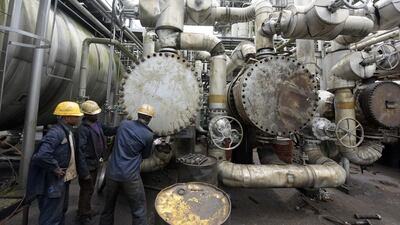Amid the most enduring global oil glut in decades, two Opec crude producers whose supplies have been crushed by domestic conflicts are preparing to add hundreds of thousands of barrels to world markets within weeks.
Libya’s state oil company has lifted curbs on crude sales from the ports of Ras Lanuf, Es Sider and Zueitina, potentially unlocking 300,000 barrels a day of supply. In Nigeria, ExxonMobil was said to be ready to resume shipments of Qua Iboe crude, the country’s biggest export grade, which averaged about 340,000 bpd in shipments last year. On top of that, a second Nigerian grade operated by Royal Dutch Shell Plc is scheduled to restart about 200,000 bpd of flow within days.
While there are reasons to be cautious about whether the barrels will actually flow as anticipated, a resumption of those supplies – more than 800,000 bpd in all – could more than triple the global surplus that has kept prices at less than half their levels in 2014. It would also come just as members of the Organization of Petroleum Exporting Countries and Russia are set to meet in Algiers this month to discuss a possible output freeze to steady world oil markets.
“If you have some restart of Nigeria and some restart of Libya, then the rebalancing gets pushed even further out,” said Olivier Jakob, the managing director at Petromatrix in Switzerland. “It complicates matters a lot before the meeting in Algeria.”
With a few exceptions, crude in New York and London has been stuck below US$50 a barrel for months. The global oil oversupply is about 370,000 bpd, according to data from the International Energy Agency.
The resumption of shipments from the three Libyan ports would allow Libya to double crude output to 600,000 bpd in four weeks, the National Oil Corp chairman Mustafa Sanalla said.
The exports are possible after a substantial improvement in the security situation there, he said. The Tripoli-based NOC lifted a measure called force majeure, which gives the company the right not to meet supply commitments.
Libya has made at least half a dozen failed pledges to restart shipments. What may be different this time is that the NOC has struck a deal with Khalifa Haftar, the commander of forces who took control of Es Sider and Ras Lanuf. He also has control of the oilfields and pipelines that feed them.
Meanwhile, Exxon has filled storage facilities at its Qua Iboe export terminal in Nigeria and is awaiting government clearance to resume shipments. Exxon declined to provide a timeline for a restart and said that a force majeure, in place since July, still stands.
In Nigeria, militant groups have repeatedly attacked oil infrastructure this year, making any resumption of flow reliant on pipeline and export terminals being secure from further incidents. Qua Iboe has been under force majeure since a “third-party effect” on a pipeline in July, according to Exxon.
“If it’s true, it’s another downwards pressure for the markets because that would be a large amount to return to the market,” said Thomas Pugh, a commodities economist at Capital Economics, adding that he doubted the resumptions will materialise given the situations in both countries.
Brent crude gained 0.4 per cent to $46.04 a barrel late morning UAE time.
business@thenational.ae
Follow The National's Business section on Twitter

